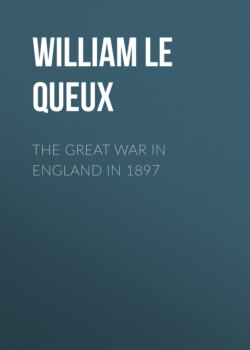Читать книгу The Great War in England in 1897 - William Le Queux - Страница 10
На сайте Литреса книга снята с продажи.
A TOTTERING EMPIRE.
ОглавлениеTable of Contents
he excitement in the theatre had increased, and the curtain had been rung down. Death shadows, grimly apparent, had fallen upon the house, and the scene was an extraordinary and unprecedented one. No such wild restlessness and impetuous agitation had ever before been witnessed within those walls. Some enthusiast of the pit, springing to his feet, and drawing a large red handkerchief from his pocket, waved it, shouting—
"Three cheers for good Old England!" to which, after a moment's silence, the audience responded lustily.
Then, almost before the last sound had died away, another patriot of the people mounted upon his seat, crying—
"No one need fear. The British Lion will quickly hold the French Eagle and the Russian Bear within his jaws. Let the enemy come; we will mow them down like hay."
This raised a combined laugh and cheer, though it sounded forced and hollow. Immediately, however, some buoyant spirits in the gallery commenced singing "Rule, Britannia," the chorus of which was taken up vigorously, the orchestra assisting by playing the last verse.
Outside, the scene in the streets was one of momentarily increasing excitement. The news had spread with marvellous rapidity, and the whole city was agog. An elbowing, waving, stormy crowd surged down the Strand to Trafalgar Square, where an impromptu demonstration was being held, the Government being denounced by its opponents, and spoken of with confidence by its supporters. The Radical, the Socialist, the Anarchist, each aired his views, and through the throng a hoarse threatening murmur condensed into three words, "Down with Russia! Down with France!" The cry, echoed by a thousand throats, mingled weirdly with the shouts of the newsmen and the snatches of patriotic songs.
London was anxious, fevered, and turbulent, that hot, moonless August night. At that hour all the shops were closed, and the streets only lighted by the lamps. From the unlighted windows the indistinct shapes of heads looking out on the scene could be distinguished.
On the pavements of Piccadilly and Knightsbridge knots of people stood arguing and wrangling over the probable turn of events. From uncouth Whitechapel to artistic Kensington, from sylvan Highgate to the villadom of Dulwich, the amazing intelligence had been conveyed by the presses of Fleet Street, which were still belching forth tons of damp news-sheets. At first there was confidence among the people; nevertheless little by little this confidence diminished, and curiosity gave place to surprise. But what could it be? All was shrouded in the darkest gloom. In the atmosphere was a strange and terrible oppression that seemed to weigh down men and crush them. London was, it appeared, walled in by the unknown and the unexpected.
But, after all, England was strong; it was the mighty British Empire; it was the world. What was there to fear? Nothing. So the people continued to shout, "Down with France! Down with the Autocrat! Down with the Tsar!"
A young man, who had been sitting alone in the stalls, had risen, electrified at the alarming news, and rushing out, hailed a passing cab, and drove rapidly away up Northumberland Avenue. This conduct was remarkable, for Geoffrey Engleheart was scarcely the man to flinch when danger threatened. He was a tall, athletic young fellow of twenty-six, with wavy brown hair, a dark, smartly-trimmed moustache, and handsome, well-cut features. He was happy and easy-going, always overflowing with genuine bonhomie. As the younger son of a very distinguished officer, he contrived to employ himself for a couple of hours a day at the Foreign Office, where, although a clerk, he held a very responsible position. Belonging to a rather good set, he was a member of several fashionable clubs, and lived in cosy, well-furnished chambers in St. James's Street.
Driving first to the house of his fiancée, Violet Vayne, at Rutland Gate, he informed her family of the startling intelligence; then, re-entering the conveyance, he subsequently alighted before the door of his chambers. As he paid the cabman, an ill-clad man pushed a newspaper into his face, crying, "'Ere y'are, sir. Extrur-special edition o' the People. Latest details. Serious scandal at the Forrin' Office."
Geoffrey started. He staggered, his heart gave a bound, and his face blanched. Thrusting half a crown into the man's dirty palm, he grasped the paper, and rushing upstairs to his sitting-room, cast himself into a chair. In breathless eagerness he glanced at the front page of the journal, and read the following:—
